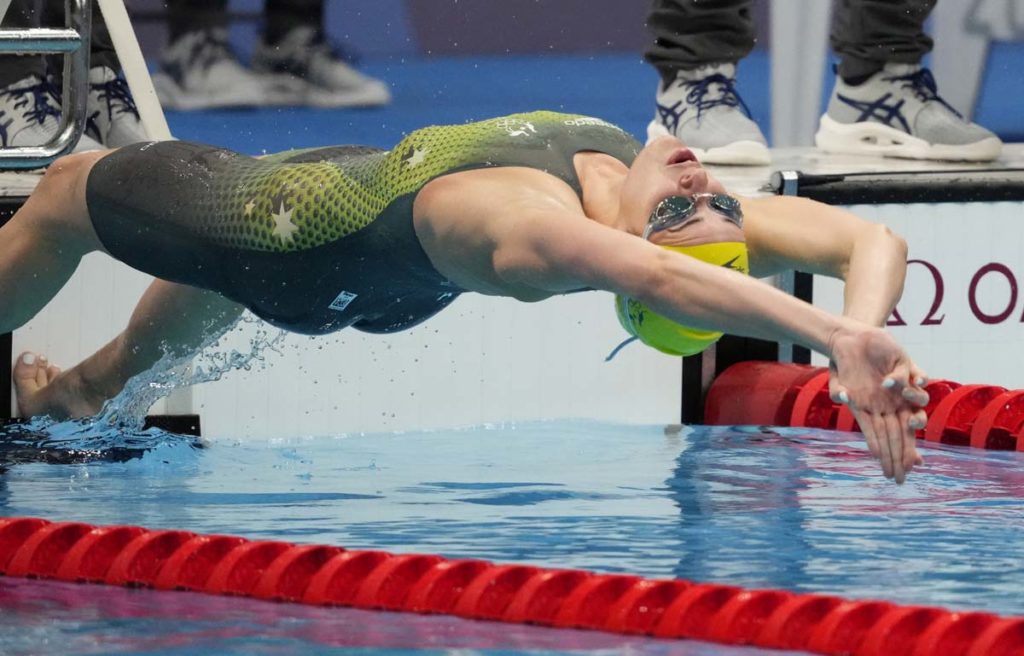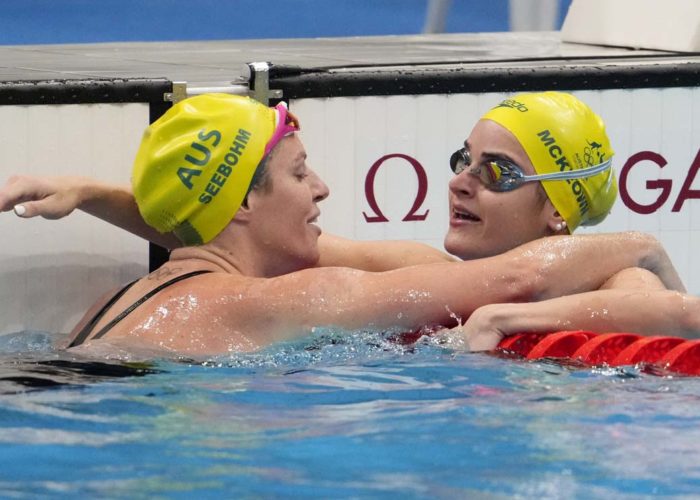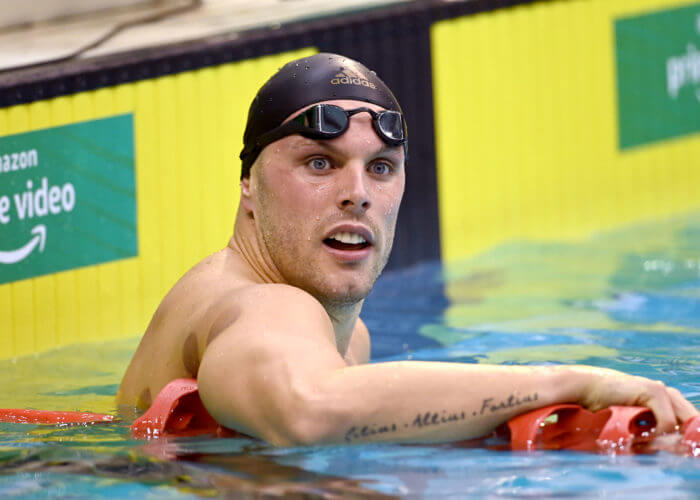Australian Round-Up: Nervous Kaylee McKeown Sets New Olympic Record And Finds Solace In Previous Owner

Editorial content for the 2021 Tokyo Olympic Games coverage is sponsored by GMX7.
See full event coverage. Follow GMX7 on Instagram at @GMX7training #gmx7

Australian Round-Up: Nervous Kaylee McKeown Sets New Olympic Record And Finds Solace In Previous Owner
Kaylee McKeown has shrugged off the nerves and delivered a record breaking start to her Tokyo campaign – relying on the former Olympic record holder and team mate Emily Seebohm to guide her along the way.
By the time McKeown and Seebohm hit the water in the last of six heats in the 100m backstroke, Seebohm’s 2012 Games mark of 58.23 had bitten the dust – broken by Rio silver medallist Kyle Masse (CAN) in 58.17 (28.19; 29.98) showing good early speed.
But that time didn’t last long with former world record holder American Regan Smith lowering it again to 57.96 (28.36; 29.60).

RECORD SETTERS: Emily Seebohm (left) and Kaylee McKeown, saying goodbye to the old record holder and hello to the new one. Photo Courtesy: Rob Schumacher — USA Today Sports.
Then McKeown and Seebohm hit the water with world record holder McKeown thinking “anything you guys can do I can do better,” lowering the record to 57.88 (28.24; 29.64), just 0.43 outside her newly created world mark of 57.45 (28.10; 29.35).
Seebohm, the 2012 Olympic silver medallist and swimming at her fourth Games, qualified in fifth place in 58.86 (28.78; 30.08).
“This is certainly a really strong field and I was very nervous walking out and it was great to have Emily by my side walking out to try and calm down those nerves, make it though the semis and relax a bit more,” said McKeown.
“Emily knows what’s she’s doing with that big smile on her face –it’s good to have her by my side and we’re doing it for each other.”
The men’s 100m backstroke saw Australia’s three-Games veteran Mitch Larkin in 52.97 (25.89;27.08) and Games rookie Isaac Cooper in 53.73 (25.91; 27.82) qualify fourth and 13th, respectively.

ANCHORMAN: Olympic champion Kyle Chalmers in a sizzling 46.63. Photo Courtesy: Delly Carr/Swimming Australia
In the men’s 4x100m freestyle relay, Olympic champion Kyle Chalmers put his hand up to “have a hit out” and delivered one if the fastest relay times ever – anchoring the team in a sizzling 46.63 (22.03) – a top five time of all time an d his fastest ever split.
Three-time Olympian Cam McEvoy led off in 49.18 (23.40), followed by Zac Incerti 47.64 (22.52) and Alex Graham 48,44 (23.35) before Chalmers set his sights on US anchorman Zach Apple, who split 47.19 (22.20).
The first heat saw the Italians (3:1029) clock the fastest qualifying time for the final, with the USA second through in 3:11.33, followed by the Australians in 3:11.89.
Then comes France (3:12.35), Brazil (3:12.59), Hungary (3:12.73), Canada (3:12.00), Russian Olympic Committee (3:13.13), Great Britain (3:1317) and Serbia (3;13.71).
“I just needed a hit out really – it’s the Olympic Games and I want to swim – to be there with the boys especially after watching (the team do so well this morning) especially these girls (in the 4x100m freestyle) I want my opportunity to race,” said Chalmers.
“So I just kinda put myself in there and get us through to the final….I think my coach (Peter Bishop) might be a disappointed I probably went a little bit harder than I needed to go but we wanted to be in those middle lanes – qualifying in third is awesome, better than we thought we could do so tomorrow is going to be exciting.”
In the men’s 200m, Thomas Neill, who only received a late call up when Chalmers withdrew (after qualifying for the 4x200m freestyle) finds himself in a battle to now make the final, qualifying in eighth in 1:45.81 (25.02; 51;80; 1:18.95; – a fraction outside his personal bet but a pb could well see him push for a top eight berth in his first Games. Elijah Winnington, a disappointing seventh in the 400m earlier in the day, faded to finish in 22nd place in 1:46.99.
While in the women’s 100m breaststroke Australian champion Chelsea Hodges in 1:06.70 (30.86;35.84) qualified 12th in the semi-finals with Jessica Hansen’s 1:07.50 (31.85; 35.65) leaving her in 20th.




